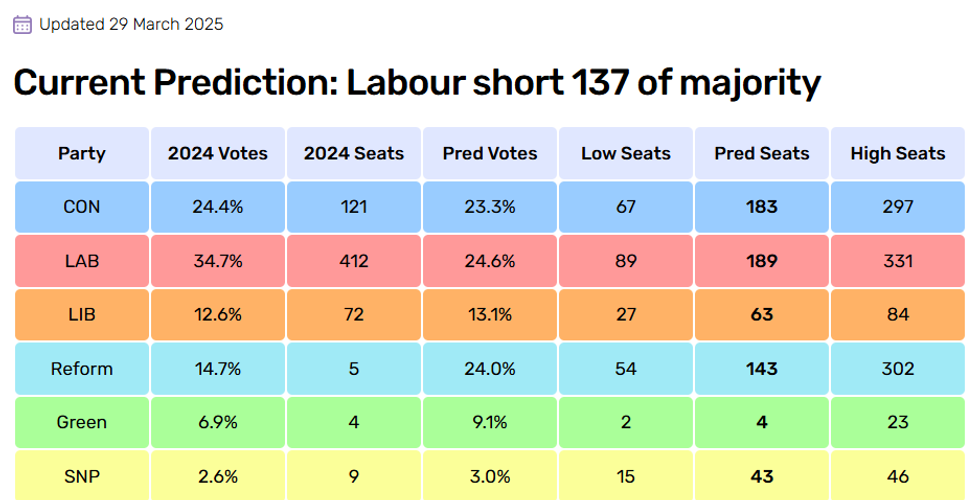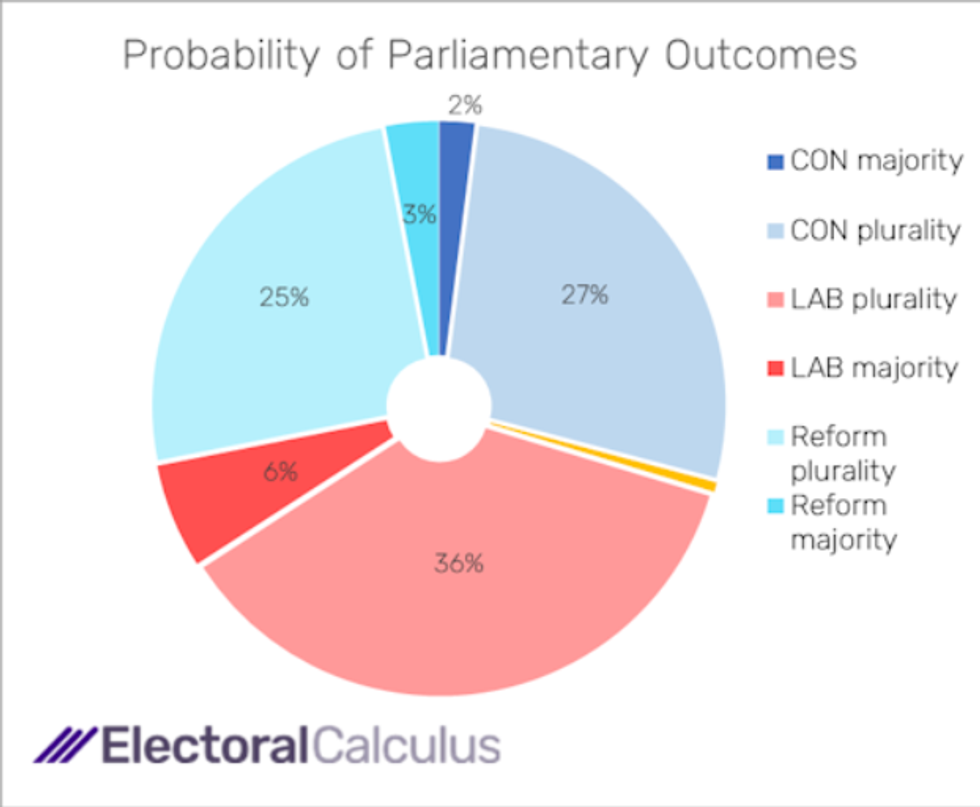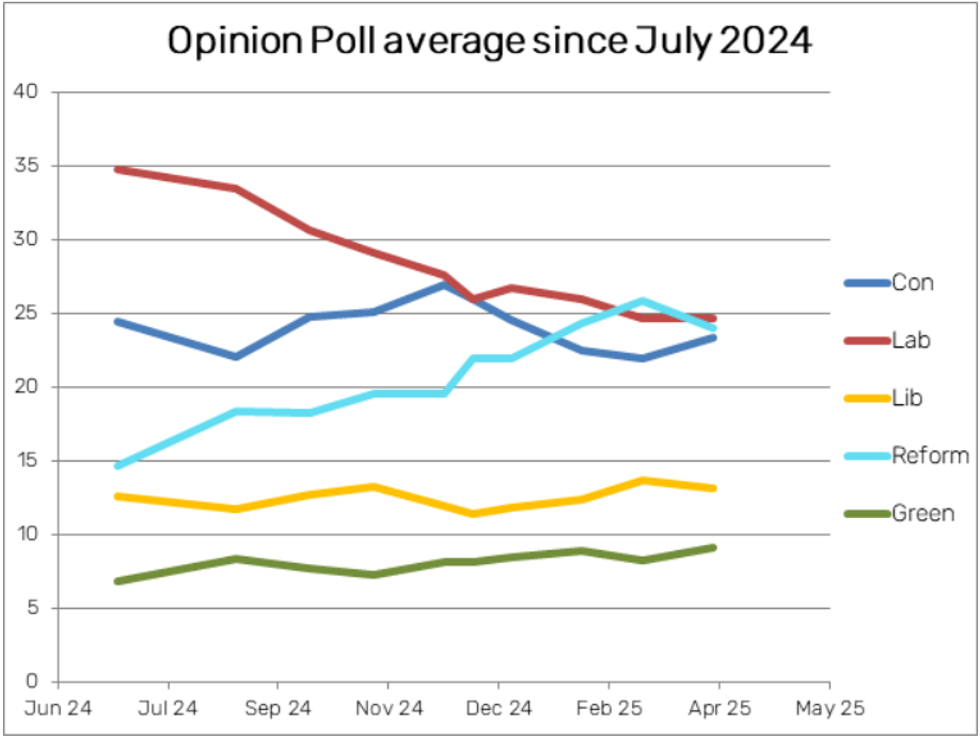WATCH IN FULL: Nigel Farage launches Reform UK local elections - 'We …
GBN
Labour tipped to lose 223 seats at the next General Election - 54 per cent of its total seat share, research finds
Don't Miss
Most Read
Trending on GB News
Labour would haemorrhage seats to Reform UK if an election was held tomorrow in major twist since the July General Election, latest polling by Electoral Calculus has shown.
The research showed Farage’s party would win 143 seats (up 138) with 121 coming at Labour’s expense. Labour would win just 189 seats (down 223), a loss of 54 per cent of its seats, while the Conservatives would scoop 183 seats (up 62).

Electoral Calculus latest seat projection
Electoral Calculus
Election guru Professor Richard Rose, Britain's senior psephologist, analysed the research and revealed how in July 2024, Farage’s party won eight times as many votes from the Tories as it did from Labour.
This was befitting of its image as a right wing, anti-immigration party targeting disenchanted Tory voters.
Though it achieved considerable success and won 4,117,610 votes (14.3 per cent of the electorate), it only won five seats, coming second in 98 constituencies.
This actually helped give Labour a huge majority as many hundreds of Labour candidates won narrow contests where the right-wing vote was split between the Tories and Reform, something pollsters labelled ‘Labour’s loveless landslide’.

Reform UK won just five MPs in July 2024 despite scooping over 4 million votes
PAHowever, since Labour took power and enacted a series of deeply unpopular socialist measures, its popularity has plummeted so much so parts of its voter base are now turning to Reform as the Tories did inJuly 2024.
“Now that Labour is in government it has become the victim of Reform's protest appeal,” argues Professor Rose.
“In the average of March opinion polls the two parties are nearly tied for first place with support for each just under 25 percent. Labour has gone down ten percentage points and Reform has gone up nine percent.
“Labour is still forecast as likely to win the most seats in the House of Commons according MRP analysis, but its projected 189 MPs is less than half the total it now has and it is 137 seats short of a parliamentary majority.
“A breakdown of Labour losses shows that it would lose 121 seats to Reform candidates if an election were held today.”
Such is the crash in support for Labour, even the Tories are benefitting and are set to win back over 60 seats.
The research also points to a Labour wipeout in Scotland where the SNP has been projected to take back all 33 seats it lost to Starmer in July, while independent candidates have also been tipped to chip away at Labour’s seat haul, notably in Wes Streeting’s Ilford North seat and Angela Rayner’s Ashton-under-Lyme patch.
This has a huge effect on what the makeup of the next government will be as currently it is a three-horse race.
Analysis of the research put the chances of a Reform minority government forming at 25 per cent (same as the Tories) while a Labour minority was at 23 per cent.

Probability of Parliamentary Outcomes
Electoral Calculus
For Reform and the Conservatives, this presents a huge conundrum. Do the parties split each other’s base and continue in opposition, or unite to form a right-wing coalition?
Combing their projected seat hauls shows that coalition would muster 326 seats, the exact minimum number needed to win a majority, thought it could not be thinner.
This would be a huge U-turn for Nigel Farage who has publicly condemned the Tories to the ‘dustbin of history’ and written them off repeatedly as ‘toast’. The Brexit supremo has also said he will not enter a coalition with the Tories.
On the left, a Labour/SNP/Lib Dem/Green coalition would muster 299 seats, not enough for a majority but enough to seriously challenge a potentially fractious government.
As Professor Rose explained: “In terms of seats, we calculate that the three big parties would be fairly equal, but Labour would (just) be the largest party.
“However, a Reform-Conservative coalition could be the most likely option in practice, albeit with a minimal majority.”
But Prof Rose stressed how fluid the situation is and how even a small swing could have a large effect on seat outcomes.
He stressed how even a swing of one per cent could translate to 30 or so seats. Likewise, a swing of two per cent could boost Reform’s haul to 60 seats.

Opinion polls average since July 2024
Electoral Calculus
It comes after Reform UK was dealt a polling blow in recent weeks after former Reform MP Rupert Lowe’s high profile fall out with Farage which resulted in him being booted out of the party.
Respected pollsters BMG Research found Reform support had dropped four percentage points since this time last month, with the Tories and Lib Dems up two points apiece.
LATEST FROM MEMBERSHIP:
With a general election four years away, the first real electoral opportunity comes in May with the parliamentary by-election in Runcorn and Helsby, sucker-punch MP Mike Amesbury’s old seat.
Most polls suggest Labour will hold on, but one by Lord Ashcroft polls points to a narrow Reform victory.
Also in May is a slew of local elections in which over 1,600 councillors will be elected.
Nigel Farage has thrust these elections into the limelight after Angela Rayner cancelled elections in nine authorities where Reform was polling strongly like Essex and Norfolk.







